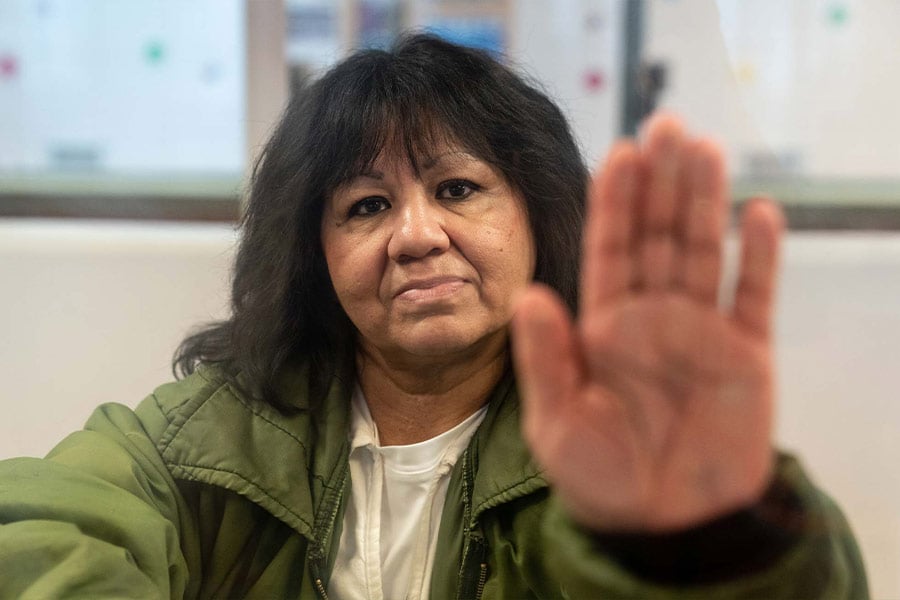Bishop Michael Olson and brother bishops petition for stay of Melissa Lucio’s execution

Melissa Lucio poses for a portrait behind glass at the Mountain View Unit in Gatesville, Texas. (Courtesy: Ilana Panich-Linsman for the Innocence Project)
FORT WORTH – Bishop Michael Olson of the Diocese of Fort Worth, along with 20 brother bishops in Texas, sent a letter to Governor Greg Abbott, Cameron County District Attorney Luis Saenz, and the Texas Board of Pardons and Paroles regarding Melissa Lucio, who is scheduled to be executed on April 27, 2022.
The letter, dated March 22, urges that the execution be stayed for a “meaningful review” of the case against Lucio, who was sentenced to death for the 2008 murder of her two-year-old daughter, Mariah, who had fallen down a flight of stairs two days earlier. Beginning two hours after Mariah’s death, detectives questioned Lucio for five hours, ending at 3 a.m. when Lucio made a vague admission of guilt to end the interrogation. She has maintained her innocence for 14 years.
The bishops stated, “Justice was not served by Ms. Lucio’s conviction and will not be served by her execution, considering her history as a victim of sexual abuse and domestic violence, her troubling interrogation by law enforcement, and the unanswered questions regarding the manner of her daughter Mariah’s death.”
The letter mentioned the bishops pray for everyone affected by the tragic loss of Mariah’s life and reported that Lucio is a faithful Catholic with “her heart centered on Christ,” according to Lucio’s spiritual adviser, Deacon Ronnie Lastovica of the Diocese of Austin.
In accordance with the teachings of the Catholic Church, Bishop Olson petitions the governor and the Texas Board of Pardons and Paroles to halt each execution, which opposes the inherent dignity of every human life.
In the letter, the bishops explained, “The Church expects accountability for harm, legitimate discipline and reparation, and the protection of society, but executions are completely unnecessary and unacceptable. Voluntarily taking a human life, regardless of the rationale, is contrary to Christian revelation.
“The Holy Father’s call to abolish the death penalty reminds us justice happens, not through punishment and vengeance, but out of a sense of responsibility beyond the present moment. Conversion, repentance, and the desire to start life anew cannot be denied anyone, including those guilty of the most serious crimes. We beseech you to commute her death sentence and conduct a meaningful review of her case to enable this family to continue the hard work of restorative justice and healing,” the letter concluded.
The Catechism of the Catholic Church, paragraph 2267, states “Recourse to the death penalty on the part of legitimate authority, following a fair trial, was long considered an appropriate response to the gravity of certain crimes and an acceptable, albeit extreme, means of safeguarding the common good.
“Today, however, there is an increasing awareness that the dignity of the person is not lost even after the commission of very serious crimes. In addition, a new understanding has emerged of the significance of penal sanctions imposed by the state. Lastly, more effective systems of detention have been developed, which ensure the due protection of citizens but, at the same time, do not definitively deprive the guilty of the possibility of redemption.
“Consequently, the Church teaches, in the light of the Gospel, that ‘the death penalty is inadmissible because it is an attack on the inviolability and dignity of the person,’ and she works with determination for its abolition worldwide.”
Currently, 196 prisoners, including six women, are held on death row in Texas.
